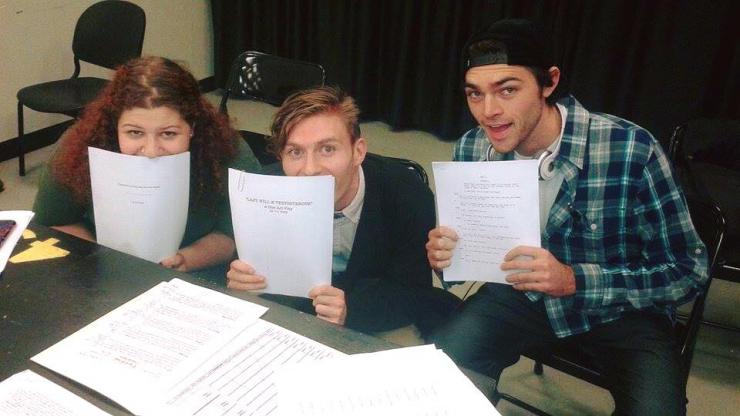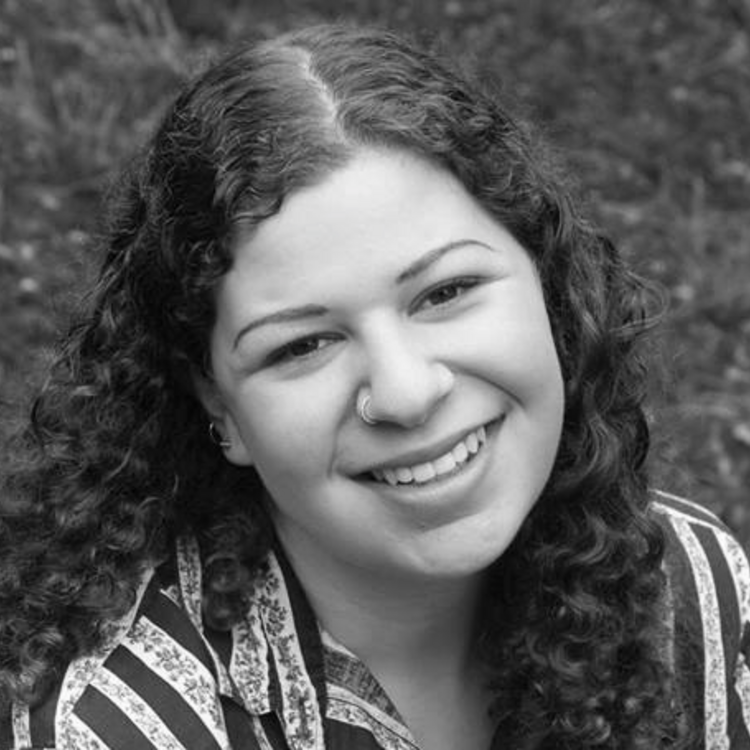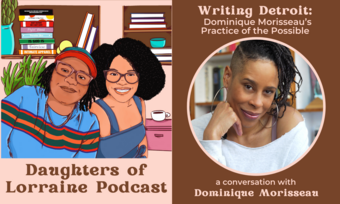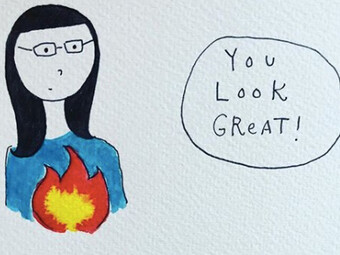Mapping the Experience of the Student Playwright
My name is Zoe. I am twenty years old. And, I’m a student playwright. Now that we’ve gotten that out of the way, I’d like to make it clear that what you’re about to read is not about me. It’s about us: the-not-quite-teen, not-quite-adult theatremakers whose stories and points of view will populate American stages in the years to come. Generally quieter, and certainly fewer in numbers than our performer peers, undergraduate students pursuing a playwriting degree can feel invisible.
In the past five or so years, a growing number of plays about the sticky, uncomfortable turmoil that is young adulthood have come to the forefront. Lauren Gunderson’s I and You examines race and gender politics through the relationship of two awkward teens. Ruby Rae Spiegel wrote her critically lauded play Dry Land—about high school swimmers and female friendship—when she was still an undergrad student at Yale. Still, it’s surely time for the theatre community at large to examine how we train and nurture our fledgling writers.
“Emerging playwright” is frequently thrown around when it comes to development and workshop opportunities for early-career writers, but how often does this term really include students? There are so few reputable, economically sound production and development opportunities that students are considered viable candidates for. As a result, there is an untold number of young people with unique dramatic voices and potential who are being swayed from pursuing playwriting as a serious profession. And, even those who do enter the professional world are often unequipped with the proper technique or experience needed to excel in the field, despite raw talent.
If we expect young actors to acquire a rigorous training before entering the world of professional theatre, why doesn’t the same expectation exist for our young dramatic writers?
It’s no secret that any career in the performing arts can be brutally difficult. But, if we expect young actors to acquire a rigorous training before entering the world of professional theatre, why doesn’t the same expectation exist for our young dramatic writers? I myself am young, and I’m learning. On my own, I can’t begin to face these enormous questions with any sustainable solutions. What I do feel capable of doing is beginning a conversation between collegiate playwrights and the greater theatre community in order to squash stereotypes, and foster potential future conversations.
With this in mind, I spoke with nine undergraduate playwrights, picking their brains about mentors, classes, majors, and the people and things that interest them as writers.
Below are just a few of the points that they made–collectively and individually.

Even the best college playwriting programs often lack opportunities for practical experience. Eliana Pipes, a sophomore at Columbia University, noted that the playwriting concentration at her college, which is nested within the theatre program, is “pretty heavily based on theory rather than practice.” According to Vassar College student John Michael Rezes, his school offers only one playwriting class. And at Yale University, there are just two unique courses.
There is an underlying assumption that we can only write about what we’ve personally experienced. Hannah Leach cited an incident that occurred in her sophomore playwriting class at NYU. “My professor asserted that I ‘probably had some subconscious psychology issues to work out’ when saying that I needed to work out some similarities of plot between two of my plays.”
But, in reality, what we write about is as varied as we are. Nancy Pop (Marymount Manhattan College) noted that she likes the absurdity of everyday life. Matt Zimmerman writes about romantic relationships, while Ian Campbell explores mental illness and black comedy. Eliana recently wrote a bilingual play, partially in Spanish, and is interested in “thwarted ambition.” Alexa Derman (Yale) writes about “teenage girls and Medieval Denmark.” John Michael is inspired by “Queerness and adolescent issues.” May Treuhaft-Ali (Wesleyan College) writes about “female rage.” Jimmy Pavlick (Vassar College) loves “Purposeful spectacle.”
Mentors are vital. The best mentors can identify what makes a burgeoning voice strong and unique, and know what a young writer needs to develop this strength. Sometimes, this comes in the form of unadulterated encouragement: “[Professor] Francine Volpe truly taught me the value of writing stories only I can write and really encouraged me to embrace the emotionality of my writing and not to be ashamed,” noted Hannah.
Sometimes, discipline and structure is the best tool a mentor can provide. Nancy appreciates learning the “What I love about [mentor Kenny Finkle] is that he is all about helping you become your own writer. You need to find your own way to write and your own voice, but you also need to develop a schedule and maintain consistency.”
A mentor can make facilitate valuable, professional connections for a student. Success in the theatre community is so heavily dependent on meeting the right people. For this reason, a writing mentor who is an active participant in the theatre community is especially valuable. “[Mentor Quiara Alegría Hudes] put me in touch with Jenny Schwartz when I was directing God's Ear, and sent Paula Vogel a paper I wrote about her,” gushed May.
A good mentor can be hard to come by, especially at a large university. More than half of the playwrights I interviewed said that they did not have a playwriting mentor, but would like one.
We are self-motivated and proficient at creating our own success. When opportunities aren’t presented to us through our degree programs, we passionately seek them elsewhere. With the support of his mentor and fellow students, Ian self-produced his play Ratcatcher on the Marymount Manhattan College campus. Alexa, who is not able to take Yale’s 400-level playwriting class until she is an upperclassman, takes a class instead at ESPA Primary Stages in New York City. Jimmy is “self-taught as far as the actual writing process goes.”
Studying playwriting without the intent of pursuing a playwriting career can foster universal skills. “I use plays to work things out,” says Matt Zimmerman (Marymount Manhattan), who primarily identifies as an actor. “Being a playwright has informed my perspectives on my other pursuits…and I don’t see a career for myself where I don’t continue to write.” And in the words of Eliana, who is pursuing a variety of creative arts: “I think that having a good ear for dialogue and a sense of different ways of structuring stories is a universally translatable skill. Stories draw people in, and narrative forms are the best way to get people invested in information.”











Comments
The article is just the start of the conversation—we want to know what you think about this subject, too! HowlRound is a space for knowledge-sharing, and we welcome spirited, thoughtful, and on-topic dialogue. Find our full comments policy here
"There is an underlying assumption that we can only write about what we’ve personally experienced." AMEN. Oh what a relief it is to hear that other professors preach this kind of teaching. I usually find myself writing horror stories involving murder and serial killers in which my screenwriting professor said to me that I must have had a tragic childhood and my scripts are simply me trying to work past them. I consider myself to be a pretty sane person. I have never once considered killing another human nor have I witnessed anyone be murdered. I write this stuff because it's interesting...it's the kind of stuff I want to read. I hate how limiting professors can be. Writing is about expressing yourself without any boundaries. You want to write a story about a talking dog on the search for booze...then write it! I hate being told that my story will lack realism because I haven't experienced something like that before. It's fiction for a reason. This article is so relateable and it gives me motivation. There shouldn't be any limitations to writing, that goes against everything that creative writing is. I wish the way writing was taught to us wasn't so limiting.
If you know of undergrads searching for programs where they will be able to write, have them consider BU's School of Theatre. Full disclosure, I oversee the writing track there. We have more than one writing class for undergrads and the program believes strongly in helping writers find their own voices. Writing courses for undergrads begin sophomore year and are offered through senior year, with opportunities for workshops and readings, as well. It is a conservatory, so not liberal arts as most of the experiences in the article are, but an undergraduate experience for students who identify as playwrights is out there. The Kennedy Center is amazing, but, if you are entering college, be sure your school or the schools to which you are applying have relationships with the Kennedy Center OR are willing to facilitate one with KC/ACTF. And, as far as I know, no college offers a degree or major in Playwrighting per se. But yes, give BU a look if you are searching for a program that offers writing through Theatre Arts.
What you describe is true for playwrights at any age--inability to find a mentor, lack of practical opportunity, preconceived notions about what you should be writing about, difficulty in networking, etc. What you've discovered isn't unique to students; it's just the life of a playwright. That said, there seem to be a lot of student contests of late, and students also have the Kennedy Center programs and awards that aren't open to anyone not in college.
It's unique in that one can enter an MFA program in playwrighting but can not yet major in it in college, the way other concentrations in theatre are able to do such as acting. It is also odd in that colleges and universities are often considered places where students should be able to try and do and succeed and fail, and one can't do that if courses are unavailable or are offered, say, only every three years--if a math course were only offered every three years we'd find that unthinkable. As a theatre community we often lament the death of the American Theatre, but if we don't teach it, good craft-- good writing-- will die out. It is of course possible to be an amazing writer without out school, but the price of theatre and the cost of living in places with lots of theatre often make this difficult.
"It is of course possible to be an amazing writer without out school, but the price of theatre and the cost of living in places with lots of theatre often make this difficult." It is more than possible, but it's something that often goes unrecognized. As for the latter half of that sentence, it almost sounds like a lot of theater only happens in expensive places, which is another part of the problem and couldn't be further from the truth.
Everything said here is something I can relate to. I was an aspiring playwright, coming fresh out of high school with ambition and drive. I wasn't sure if I should attend college or even afford college to pursue my career as a playwright. I chose not to go to school. I felt there was a ton of opportunity me elsewhere without going to college. The programs were mediocre and the renowned ones I couldn't get into. After two years of struggling to find work, barely making end's meat to survive, I stumbled upon what I would call has changed my life forever. I found this great man who told me that I could write plays and whatever I wanted for cold, hard cash. So, I am not the one to let opportunity slip by the door. I seized it and never looked back. I started writing plays, blogs, and articles about practically anything. The best part was, I never lost my writer's creativity. I had total freedom to write about anything. I worked my way up to making $5500/month as a freelance writer. Oh yeah, I do this from the comfort of my home and laptop. If you're even remotely interested in how I accomplished this, visit this website that will set you up for success: www.deservingwriter.com
I agree that there are not too many playwriting programs at the undergrad level. I attended Vassar back in the 80s and there was only one course offered every few years. Since then some colleges and universities have offered more course and more opportunities for productions and workshop/readings of plays by student playwrights. For example (blatant plug here): http://finearts.uky.edu/the...